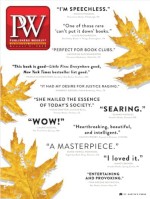Few people are happy with how books are sold at literary festivals. New York City publishers think festivals don’t move books at volume. PW reported that attendees at this year’s BookCon were unsatisfied with aspects of the event. “There’s hardly any ARC drops or free books,” one BookCon attendee said. “It felt a lot like we paid for a ticket just to be allowed in to buy things,” said another.
But that’s not the case in Portland, Ore., where book vouchers power a high volume of book sales at the 10,000-person, one-day Portland Book Festival held each November. A $5 voucher is rolled into the cost of a festival ticket. Admission is cheap at $15 for preorders and $20 at the door. With vouchers for all paid ticketholders, festivalgoers get up to one-third of their entry fees back to spend with vendors at the festival, including booksellers at the nine event locations and small- and midsize presses that exhibit their wares on the expo floor.
The voucher idea appealed to Amanda Bullock shortly after she was hired in 2015 to be director of the PBF and moved to Portland from New York. In New York, she noticed, “you’d pay for a $10 event ticket, and they’d throw in a free drink.” Why not do the same thing for books?
Vouchers keep everybody happy because they are not a discount. Literary Arts, the largest literary nonprofit in Oregon, which acquired PBF in 2015, absorbs the cost, and booksellers and publishers get paid their full prices. “With the preorder opportunity last year for Abbi Jacobson and Tom Hanks, PBF sales are about double a robust author event that we host at an off-site location,” observes Kim Sutton, chief customer officer at Portland’s Powell’s Books. “Vouchers are very helpful in driving sales at PBF, to incent a purchase that may not have happened or to allow festivalgoers to treat themselves to an additional item.”
Vouchers lower the risk of buying a new thing. Craig Bunn, associate sales manager for Pomegranate Communications, said the press collected three to four dozen vouchers at last year’s PBF when it rented a large endcap booth on the expo floor. Pomegranate sold out of boxed notes, Edward Gorey specialty items, jigsaw puzzles, and knowledge cards. “People often spend more money when it feels like they’re getting a discount,” Bunn notes.
Because the vouchers can only be spent in person and on the day of the festival, people want to use the $5 for something. “We have seen an uptick in sales,” says Rachel Bell, publisher of Overcup Books. “As an independent publisher with a small catalogue, we love it when people deem our titles voucher worthy.”
Andrew Proctor, executive director of Literary Arts, says vouchers have radically stimulated book sales at the festival. In 2018, 78% of PBF ticketholders bought at least one book; 29% bought three or more books. Well over half (54.7%) of the 6,425 vouchers were used—that’s 3,515 purchases made using vouchers. In 2017, just over 47% of vouchers were used.
Increased voucher use might correlate with the growing number of millennials at PBF—they were the largest demographic group among 2018 ticketholders. PBF’s slate of diverse, hip, queer, and famous authors hit the marketing sweet spot for the 25–34-year-old attendees. Millennials are likely to value or need vouchers more than their middle-aged counterparts.
How can a festival afford vouchers? “We essentially treat the festival passes as costing $10,” explains Literary Arts’ Bullock. “Since we’ve included the vouchers from the beginning, there was no adjustment needed to accommodate them.”
Vouchers mean that booksellers don’t need to slash prices. “Vouchers are the only discounts we offer on the products we sell at PBF,” says Powell’s Sutton. Everybody wins: customers get a discount and sellers get full price.
The concept of using vouchers seems to be spreading. Wordplay, which bills itself as “Minnesota’s largest celebration of readers, writers, and books,” offered $5 vouchers to each of its 10,000 ticketholders at its inaugural book festival in May 2019. Booksellers at the festival felt vouchers helped with hardcover sticker shock, says Wordplay founder Steph Opitz.
Kathi Inman Berens is an assistant professor of book publishing at Portland State University.



 Volume 266
Issue 31
08/05/2019
Volume 266
Issue 31
08/05/2019





